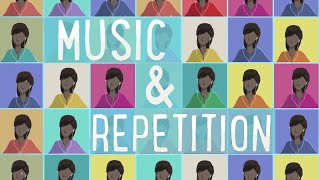(单词翻译:单击)
How many times does the chorus repeat in your favorite song?
在你最喜欢的歌曲中,高潮部分重复了几遍?
And, take a moment to think, how many times have you listened to it?
花些时间想一想,你一共听了它几遍?
Chances are you've heard that chorus repeated dozens, if not hundreds, of times,
事实上,即使你听了它没有几百次,也有几十次了,
and it's not just popular songs in the West that repeat a lot.
并且并不是只有西方的流行歌曲才会经常重复播放。
Repetition is a feature that music from cultures around the world tends to share.
世界各地的音乐都会重复的播放。
So, why does music rely so heavily on repetition?
那么,为什么音乐都会被重复的播放呢?
One part of the answer come from what psychologists call the mere-exposure effect.
原因之一就是心理学家的所提出的曝光效应。
In short, people tend to prefer things they've been exposed to before.
简而言之,人们更喜欢他们之前曾经遇到过的东西。
For example, a song comes on the radio that we don't particularly like,
举个例子,电台播放了一首我们并不是很感冒的歌,
but then we hear the song at the grocery store, at the movie theater and again on the street corner.
但是我们又在杂货店,在电影院和在街角听到了这首歌。
Soon, we are tapping to the beat, singing the words, even downloading the track.
不久,我们就会打着节拍,开始唱这首歌,甚至下载这首歌。
This mere-exposure effect doesn't just work for songs.
这种曝光效应不仅仅体现在歌曲上。
It also works for everything from shapes to Super Bowl ads.
它也会体现在各种事情上,从图形到超级碗的广告都有它的身影。
So, what makes repetition so uniquely prevalent in music?
但是,有没有特别的因素使音乐的重复如此普遍?
To investigate, psychologists asked people to listen to musical compositions that avoided exact repetition.
在调查中,心理学家让人们去听一些乐曲,一些没有明显重复的乐曲。
They heard excerpts from these pieces in either their original form,
他们听了一些音乐片段,这些片段有些是未经改动的,
or in a version that had been digitally altered to include repetition.
有些则是人工添加重复片段的。
Although the original versions had been composed by some of the most respected 20th century composers,
即使在那些未经改动的乐曲中,有些是被20世纪最杰出的作曲家谱写的,
and the repetitive versions had been assembled by brute force audio editing,
而那些包含重复片段的乐曲则是用音频编辑器硬生生的修改的,
people rated the repetitive versions as more enjoyable, more interesting and more likely to have been composed by a human artist.
人们依旧认为包含重复片段的乐曲更令人愉悦,使人更感兴趣,甚至更像是由人类作曲家谱写的。
Musical repetition is deeply compelling.
重复的音乐如此使人无法抗拒。
Think about the Muppets classic, 'Mahna Mahna.'
还记得经典木偶剧场里面的“Maha Maha”吗?
If you've heard it before, it's almost impossible after I sing, 'Mahna mahna,' not to respond, 'Do doo do do do.'
如果你之前听过这个,那在我唱出“maha maha”之后,你一定会情不自禁的唱出“do doo do do do”。
Repetition connects each bit of music irresistibly to the next bit of music that follows it.
重复使音乐的节拍相连,下一节拍自然而然的连了进来。
So when you hear a few notes, you're already imagining what's coming next.
因此当你听到一些音符的时候,你已经在脑海里想到了下一个音符。
Your mind is unconsciously singing along, and without noticing, you might start humming out loud.
你会情不自禁的唱下去,甚至你可能都不会注意到自己哼歌的声音越来越大。

Recent studies have shown that when people hear a segment of music repeated,
最近的调查表明当人们听到音乐中的一节被重复,
they are more likely to move or tap along to it.
人们就很可能随着音乐摇摆或者打节拍。
Repetition invites us into music as imagined participants, rather than as passive listeners.
重复的音乐更有代入感,使我们身临其境,而不是被动的听下去。
Research has also shown that listeners shift their attention across musical repetitions,
研究还表明了在音乐重复过程中,人们会转移自己的关注点,
focusing on different aspects of the sound on each new listen.
每新听一次就会注意到一些不同之处。
You might notice the melody of a phrase the first time,
在听第一遍时,你可能会注意到一个短语伴随的旋律,
but when it's repeated, your attention shifts to how the guitarist bends a pitch.
但是当音乐重复时,你的注意力就可能会转移到吉他演奏者弹出的一个高音。
This also occurs in language, with something called semantic satiation.
这种情况也发生在语言中,被称为语义饱和。
Repeating a word like atlas ad nauseam can make you stop thinking about what the word means,
重复一个单词,比如不断重复“atlas”直到厌烦,这样做可以使你不再想这个词是什么意思,
and instead focus on the sounds: the odd way the 'L' follows the 'T.'
而是注意到“L”跟在“T”后面会发出很奇怪的音。
In this way, repetition can open up new worlds of sound not accessible on first hearing.
在这种情况下,重复会为你打开发音这个新世界的大门,这在第一次听时是无法做到的。
The 'L' following the 'T' might not be aesthetically relevant to 'atlas,'
“L”跟随“T”在字面上看起来好像和“atlas”没太大的关系,
but the guitarist pitch bending might be of critical expressive importance.
但是吉他演奏手演奏的高音就可能在表现力方面很有意义。
The speech to song illusion captures how simply repeating a sentence a number of times
音调带来的想像可以阐明重复一个句子很多次
shifts listeners attention to the pitch and temporal aspects of the sound,
可以很简单的转移听音乐的人的注意力,把注意力转移到乐曲的音高或者其他方面。
so that the repeated spoken language actually begins to sound like it is being sung.
因此那些不断被重复说出的话语有时听起来好像是被唱出来的。
A similar effect happens with random sequences of sound.
相同的情况也会发生在当人们听到随机排列的音符的时候。
People will rate random sequences they've heard on repeated loop as more musical than a random sequence they've only heard once.
相比起那些没有重复播放的随机排列的音符,人们会觉得重复播放的随机排列的音符更加有音乐性。
Repetition gives rise to a kind of orientation to sound that we think of as distinctively musical,
重复使音符们变得更加有秩序,所以当我们听到它时,会认为有很显著的音乐性,
where we're listening along with the sound, engaging imaginatively with the note about to happen.
沉浸在脑海的想象中,思考着下一个音符会是什么。
This mode of listening ties in with our susceptibility to musical ear worms,
这种效应会给我们带来音乐挥之不去的效果,
where segments of music burrow into our head, and play again and again, as if stuck on repeat.
因此音乐的片段会在我们脑中不断回旋,一边又一边的回响。
Critics are often embarrassed by music's repetitiveness, finding it childish or regressive,
评论家经常会不喜欢音乐的重复性,认为它很幼稚,没有创造力,
but repetition, far from an embarrassment,
但是对于音乐的重复,其实并不会令人憎恶,
is actually a key feature that gives rise to the kind of experience we think about as musical.
反而是一种音乐的主要特性,这种特性可以给我们带来富有音乐感的体验。


